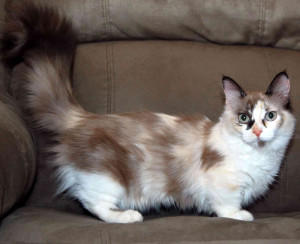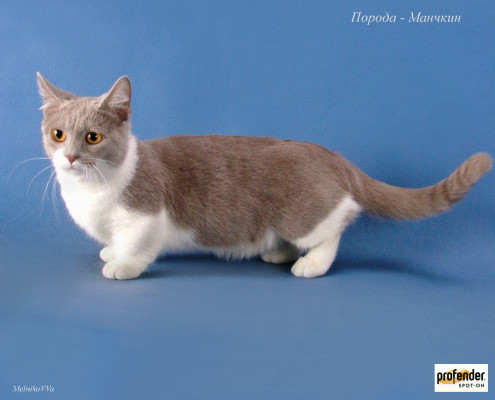Munchkin

Meoww!!
The Munchkin is generally described as a sweet-natured, playful, people-oriented, outgoing and intelligent cat which responds well to being handled. The shortness of their legs does not seem to interfere with their running and leaping abilities.
In 5 Words
- Extremely playful
- Outgoing
- Intelligent
- Sociable
- Loving
Snapshot
Height:7-8 inches
Weight:5-9 pounds
Lifespan:12-14 years
Physique:small, short legs
Best suited for:Families with children or single people
Temperament:Playful and active. Kitten-like well into adulthood
Comparable Breed:Chartreux, Somali, Cornish Rex

Characteristics
Learn About the Munchkin
The modern version of the Munchkin breed was developed in Louisiana in the 1980s. The breed began when a short-legged tomcat named Talouse bred with feral Domestic Shorthairs around the town of Monroe, creating a population of short-legged cat.
The cat’s movements were similar to a ferret, and inspite of the short legs, the cat was otherwise normal. Unfortunately these cats vanished during World War II.
In a British veterinary report in 1944, Dr. H E Williams-Jones described four generations of short-legged cats including an 8 year old black female that had extremely healthy life. The report stated that her dam, grand-dam and progeny all were similar and the only difference between them and normal cats were the short legs.
The racy, low-slung Munchkin is built for speed and agility. To appreciate these bundles of energy, one has to know one. They have lots of energy and great cornering speed-just like the sleek race cars they resemble-and tend to stay low to the ground although they are perfectly capable of jumping.
The Munchkin is a medium sized cat, it can come in any coat length. No purebred should ever be used as an outcross, and so breeders also face the challenge of trying to achieve consistency in type, while using domestics to outcross.
Munchkins owe their short legs to a naturally-occurring genetic mutation, and not from human manipulation. The gene responsible for the breed’s short legs has been likened to the same one that gives Dachsunds and Welsh Corgis their diminutive stature.
The Munchkin is famous for its short legs, the result of a recessive gene. The rest of the cat’s body retains normal proportions.
Munchkins come in both long and shorthaired varieties, and in almost every color and pattern.
The Munchkin is generally described as a sweet-natured, playful, people-oriented, outgoing and intelligent cat which responds well to being handled. The shortness of their legs does not seem to interfere with their running and leaping abilities.
These sociable cats are extremely playful and love to run, chase an play with toys. They love company including children, dogs and other pets, leading them a merry chase as they zoom by in their games. Munchkins are extremely curious and will sit up on their hind legs like a rabbit to get a better view of something that has caught their attention. These self-assured cats leave no stone unturned or corner unexplored. Munchkins are sweet natured, outgoing & intelligent cats. They are known for being confident & adventurous cats.
Because Munchkins may be bred to a wide number of breeds, an individual cat’s personality will depend on its inheritance. All-in-all, however, they have been described as loving, sociable, and playful by Munchkin fans.
Munchkins suffer from the same common health problems as other cats. There has been some concern that that they may be more prone to back and joint problems similar to those afflicting Dachshunds and Corgis, but the prevalence of a short-legged back defect in these cats is currently unknown.
Feed your cat twice a day. When still kitten, feed it 3x a day for a healthy diet. You can also provide cat milk and treats as a reward for a better house cat living in your great environment. Provide greats toys for your cats so that it could avoid by getting bored. Bored cats would be very territorial cause they’re marking your space as it environment to use instead of the toys. Munchkins needs to be groomed to avoid tangling or matting especially long-haired ones. Groom your cat with cat combs almost found in pet stores. Also some cats suffer from gingivitis which is a dental problem that’s why brush your munchkin’s teeth more often to avoid that kind of disease.






